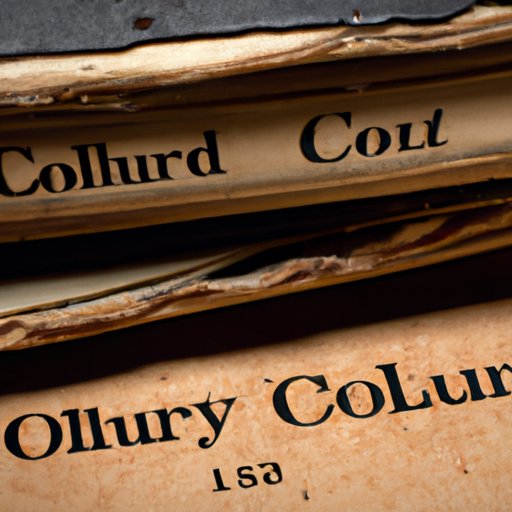
Introduction
Old court records are not only fascinating for history enthusiasts, but they can also provide valuable insights for genealogy research. They can help us fill in gaps in family trees, understand our ancestors’ professions, and explore the circumstances of past legal cases and judgments. However, tracking down old court records can be a challenging task, especially since many of them are not available online. In this article, we will guide you through the process of finding old court records online for free.
Unlocking the Vault: A Guide to Finding Old Court Records Online for Free
Before we dive into the specifics, let’s define what old court records are and why they can be hard to find. Old court records include a range of legal documents such as pleadings, judgments, indictments, and transcripts from past court cases. These records play an important role in legal research, genealogy, and historical study. However, many old court records are not digitized and can only be found in physical archives, courthouses, and libraries. Additionally, tracking down specific court records can be frustrating since abstracts can be vague, incomplete, or simply unavailable.
So how can you access old court records online? Let’s take a look.
Discover Your Family’s Legal History: How to Locate Old Court Records Online
For those interested in genealogy research, old court records can provide a wealth of information about our ancestors’ lives. To start your search for old court records, you should begin by gathering as much information as possible about the person or case in question. This could include names, dates, case numbers, and jurisdictions. One useful resource for genealogy research is the National Archives and Records Administration (NARA), which provides access to a range of historical documents, including old court records.
When it comes to the types of court records available, they can range from local criminal cases to federal court rulings. Knowing which type of record you are looking for will be crucial in finding it online. A good starting point is to search for state or county court websites that have digitized court records. If you know the jurisdiction in which the trial or case occurred, you can search for specific websites using Google or other search engines.
Unearthing the Past: Tools and Techniques for Finding Old Court Records Online
Once you’ve gathered as much information as possible and have a sense of what types of records are available, you can start using different online tools and search engines to locate old court records. Some useful sites for genealogy research include Ancestry.com, FamilySearch.org, and MyHeritage.com. Additionally, you can search for specific law firms or attorneys who have historical records online. Remember to use specific search terms and keywords to narrow down your search results.
Besides general genealogy websites, many state, and federal databases house old court records. For example, the Library of Congress provides access to published court opinions for U.S. federal courts since 1991 on its website. Moreover, the National Center for State Courts gives access to state court cases for some states. Accessing old court records from government websites can be a time-consuming process, so be sure to read guidelines to get accurate data when involved in legal processes.
Hidden Treasures: How to Access Old Court Records from the Comfort of Your Home
If you prefer to access court records from the comfort of your home, some sites provide access to old court records for free. Some websites offer completely free access, while others offer a limited number of free searches before requiring a fee. One popular site is the Free Public Records Directory, which provides access to many types of public records, including old court records. Another useful site is Pacer.gov, which houses federal court records, usually offering free information with the risk of paying a small fee if too much data is required.
From Pleadings to Judgments: Tips for Finding Old Court Records Online for Free
If you are looking for specific pleadings or judgments in old court records, there are different methods for locating them. When dealing with pleadings, it is important to determine which type is required. Pleadings are arranged by type, and they include complaints, answers, motions, and other standardized documents. Once you’ve determined the type of pleading you need, you can start looking for a website that houses those records. For judgments, you can search for the court’s website using the jurisdiction and the specific case number in focus. Additionally, using authorized government websites can be beneficial to finding pleadings and judgments quickly.
Conclusion
Locating old court records online might seem intimidating at first, but with the right resources and techniques, it is possible to delve into past legal cases, explore family history, and gain insights into our ancestors’ lives. Whether you are a genealogy enthusiast or a legal researcher, old court records offer a treasure trove of information waiting to be discovered. Remember to be patient and persistent in your search, and don’t hesitate to enlist the help of professional researchers if necessary.




